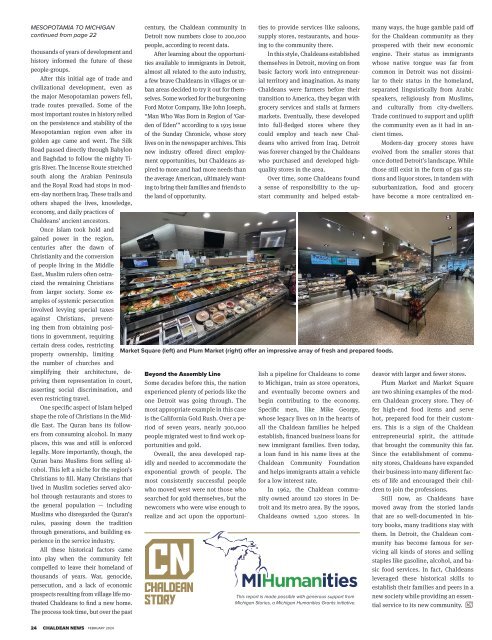You also want an ePaper? Increase the reach of your titles
YUMPU automatically turns print PDFs into web optimized ePapers that Google loves.
MESOPOTAMIA TO MICHIGAN<br />
continued from page 22<br />
thousands of years of development and<br />
history informed the future of these<br />
people-groups.<br />
After this initial age of trade and<br />
civilizational development, even as<br />
the major Mesopotamian powers fell,<br />
trade routes prevailed. Some of the<br />
most important routes in history relied<br />
on the persistence and stability of the<br />
Mesopotamian region even after its<br />
golden age came and went. The Silk<br />
Road passed directly through Babylon<br />
and Baghdad to follow the mighty Tigris<br />
River. The Incense Route stretched<br />
south along the Arabian Peninsula<br />
and the Royal Road had stops in modern-day<br />
northern Iraq. These trails and<br />
others shaped the lives, knowledge,<br />
economy, and daily practices of<br />
Chaldeans’ ancient ancestors.<br />
Once Islam took hold and<br />
gained power in the region,<br />
centuries after the dawn of<br />
Christianity and the conversion<br />
of people living in the Middle<br />
East, Muslim rulers often ostracized<br />
the remaining Christians<br />
from larger society. Some examples<br />
of systemic persecution<br />
involved levying special taxes<br />
against Christians, preventing<br />
them from obtaining positions<br />
in government, requiring<br />
certain dress codes, restricting<br />
property ownership, limiting<br />
the number of churches and<br />
simplifying their architecture, depriving<br />
them representation in court,<br />
asserting social discrimination, and<br />
even restricting travel.<br />
One specific aspect of Islam helped<br />
shape the role of Christians in the Middle<br />
East. The Quran bans its followers<br />
from consuming alcohol. In many<br />
places, this was and still is enforced<br />
legally. More importantly, though, the<br />
Quran bans Muslims from selling alcohol.<br />
This left a niche for the region’s<br />
Christians to fill. Many Christians that<br />
lived in Muslim societies served alcohol<br />
through restaurants and stores to<br />
the general population — including<br />
Muslims who disregarded the Quran’s<br />
rules, passing down the tradition<br />
through generations, and building experience<br />
in the service industry.<br />
All these historical factors came<br />
into play when the community felt<br />
compelled to leave their homeland of<br />
thousands of years. War, genocide,<br />
persecution, and a lack of economic<br />
prospects resulting from village life motivated<br />
Chaldeans to find a new home.<br />
The process took time, but over the past<br />
century, the Chaldean community in<br />
Detroit now numbers close to 200,000<br />
people, according to recent data.<br />
After learning about the opportunities<br />
available to immigrants in Detroit,<br />
almost all related to the auto industry,<br />
a few brave Chaldeans in villages or urban<br />
areas decided to try it out for themselves.<br />
Some worked for the burgeoning<br />
Ford Motor Company, like John Joseph,<br />
“Man Who Was Born in Region of ‘Garden<br />
of Eden’” according to a 1915 issue<br />
of the Sunday Chronicle, whose story<br />
lives on in the newspaper archives. This<br />
new industry offered direct employment<br />
opportunities, but Chaldeans aspired<br />
to more and had more needs than<br />
the average American, ultimately wanting<br />
to bring their families and friends to<br />
the land of opportunity.<br />
Market Square (left) and Plum Market (right) offer an impressive array of fresh and prepared foods.<br />
CHALDEAN<br />
STORY<br />
Beyond the Assembly Line<br />
Some decades before this, the nation<br />
experienced plenty of periods like the<br />
one Detroit was going through. The<br />
most appropriate example in this case<br />
is the California Gold Rush. Over a period<br />
of seven years, nearly 300,000<br />
people migrated west to find work opportunities<br />
and gold.<br />
Overall, the area developed rapidly<br />
and needed to accommodate the<br />
exponential growth of people. The<br />
most consistently successful people<br />
who moved west were not those who<br />
searched for gold themselves, but the<br />
newcomers who were wise enough to<br />
realize and act upon the opportunities<br />
to provide services like saloons,<br />
supply stores, restaurants, and housing<br />
to the community there.<br />
In this style, Chaldeans established<br />
themselves in Detroit, moving on from<br />
basic factory work into entrepreneurial<br />
territory and imagination. As many<br />
Chaldeans were farmers before their<br />
transition to America, they began with<br />
grocery services and stalls at farmers<br />
markets. Eventually, these developed<br />
into full-fledged stores where they<br />
could employ and teach new Chaldeans<br />
who arrived from Iraq. Detroit<br />
was forever changed by the Chaldeans<br />
who purchased and developed highquality<br />
stores in the area.<br />
Over time, some Chaldeans found<br />
a sense of responsibility to the upstart<br />
community and helped establish<br />
a pipeline for Chaldeans to come<br />
to Michigan, train as store operators,<br />
and eventually become owners and<br />
begin contributing to the economy.<br />
Specific men, like Mike George,<br />
whose legacy lives on in the hearts of<br />
all the Chaldean families he helped<br />
establish, financed business loans for<br />
new immigrant families. Even today,<br />
a loan fund in his name lives at the<br />
Chaldean Community Foundation<br />
and helps immigrants attain a vehicle<br />
for a low interest rate.<br />
In 1962, the Chaldean community<br />
owned around 120 stores in Detroit<br />
and its metro area. By the 1990s,<br />
Chaldeans owned 1,500 stores. In<br />
This report is made possible with generous support from<br />
Michigan Stories, a Michigan Humanities Grants initiative.<br />
many ways, the huge gamble paid off<br />
for the Chaldean community as they<br />
prospered with their new economic<br />
engine. Their status as immigrants<br />
whose native tongue was far from<br />
common in Detroit was not dissimilar<br />
to their status in the homeland,<br />
separated linguistically from Arabic<br />
speakers, religiously from Muslims,<br />
and culturally from city-dwellers.<br />
Trade continued to support and uplift<br />
the community even as it had in ancient<br />
times.<br />
Modern-day grocery stores have<br />
evolved from the smaller stores that<br />
once dotted Detroit’s landscape. While<br />
those still exist in the form of gas stations<br />
and liquor stores, in tandem with<br />
suburbanization, food and grocery<br />
have become a more centralized endeavor<br />
with larger and fewer stores.<br />
Plum Market and Market Square<br />
are two shining examples of the modern<br />
Chaldean grocery store. They offer<br />
high-end food items and serve<br />
hot, prepared food for their customers.<br />
This is a sign of the Chaldean<br />
entrepreneurial spirit, the attitude<br />
that brought the community this far.<br />
Since the establishment of community<br />
stores, Chaldeans have expanded<br />
their business into many different facets<br />
of life and encouraged their children<br />
to join the professions.<br />
Still now, as Chaldeans have<br />
moved away from the storied lands<br />
that are so well-documented in history<br />
books, many traditions stay with<br />
them. In Detroit, the Chaldean community<br />
has become famous for servicing<br />
all kinds of stores and selling<br />
staples like gasoline, alcohol, and basic<br />
food services. In fact, Chaldeans<br />
leveraged these historical skills to<br />
establish their families and peers in a<br />
new society while providing an essential<br />
service to its new community.<br />
24 CHALDEAN NEWS <strong>FEBRUARY</strong> <strong>2024</strong>
















